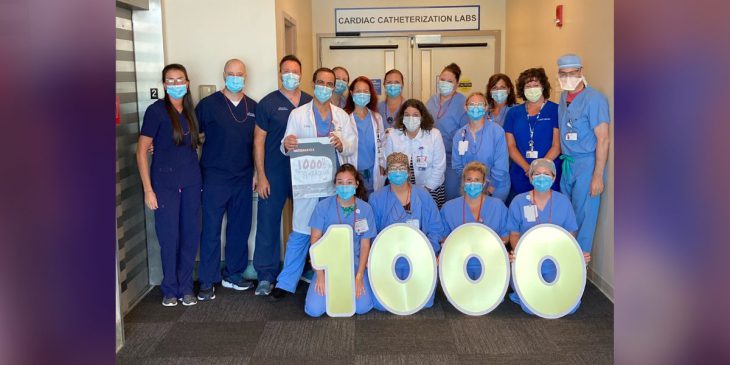The 1,000th WATCHMAN procedure at UPMC Altoona was completed by teams led by Dr. George Jabbour, medical director, Cardiac Catheterization Lab, UPMC Altoona, and Kristi Montrella, CRNP, MSN, structural heart coordinator and nurse practitioner, UPMC Heart and Vascular Institute at UPMC Altoona.
The WATCHMAN implant is a one-time, minimally invasive procedure for people with atrial fibrillation that is not caused by a heart valve problem, also known as non-valvular AFib, who also have a need for an alternative to blood thinners to lower their risk of stroke.
The small device is implanted in the left atrial appendage of the heart to seal it off, preventing blood clots from forming and causing a stroke.
Both Montrella and Jabbour have been with UPMC Altoona since 2009 and joined forces from the get-go.
Montrella is local, growing up in Hollidaysburg, and Jabbour moved to Altoona from New York City.
“We both had a special interest in the structural heart, and we developed the program at Altoona together,” said Montrella. “I coordinated and developed the logistics, while Dr. Jabbour performed the procedures.”
The WATCHMAN program began at Altoona in February 2019 and made an immediate impact on the community and patients in need of advanced cardiovascular care.
In 2022, the program continues to grow and advance UPMC Altoona’s heart and stroke services as a direct response to serving UPMC’s defined 2022 to 2025 community health need for chronic disease management, specifically enhancing care and services related to heart disease and stroke.
“When our structural cardiology program began developing, we identified Altoona was, at that time, underserved,” said Jabbour. “Most of our patients were afraid to travel extended distances to receive the advanced cardiology care they needed and deserved, so we decided to bring the program to Altoona to better serve our community.”
To reduce the likelihood of a stroke, non-valvular AFib can mean a lifetime of blood thinners for patients, which also carries the fear of an increased risk of bleeding and bleeding from a fall. With Altoona’s structural heart program, which specializes in defects or disorders in the heart’s structure, patients can receive treatment, like the WATCHMAN implant, to improve their quality of life and start their journey away from blood thinners.
“Patients are able to be more active and feel more comfortable when they’re off their blood thinners,” said Jabbour. “They are more confident with reduced anxiety; they don’t have to worry about being home alone, playing golf, or even walking their dog.”
Although the WATCHMAN implant is only about the size of a quarter and made of light and compact materials, the impact of such a small device is life changing.
“With the right training and the right people, you can really deliver the highest quality to change the life course for a patient,” said Jabbour. “For us at UPMC Altoona, we pride ourselves on our quality and advanced capabilities.”
The UPMC Heart and Vascular Institute at UPMC Altoona provides a full range of comprehensive cardiovascular services for the community.









